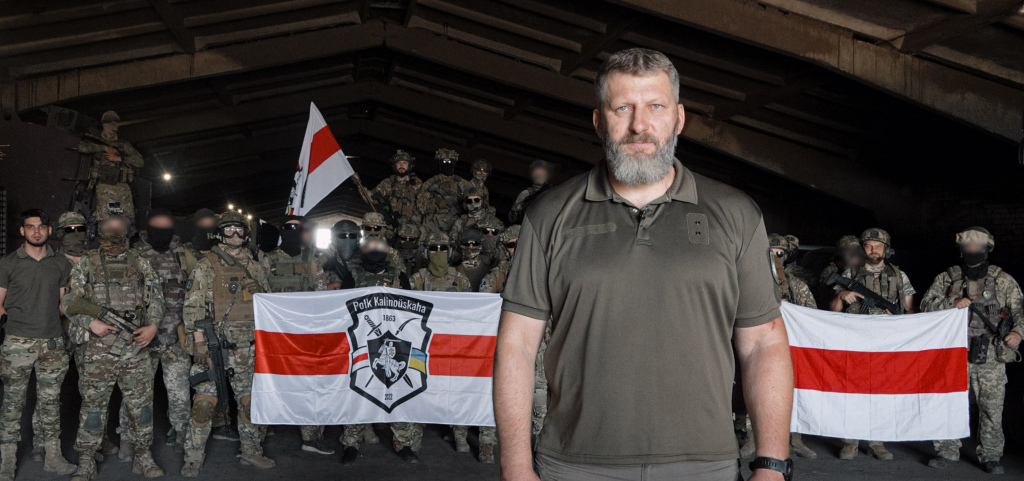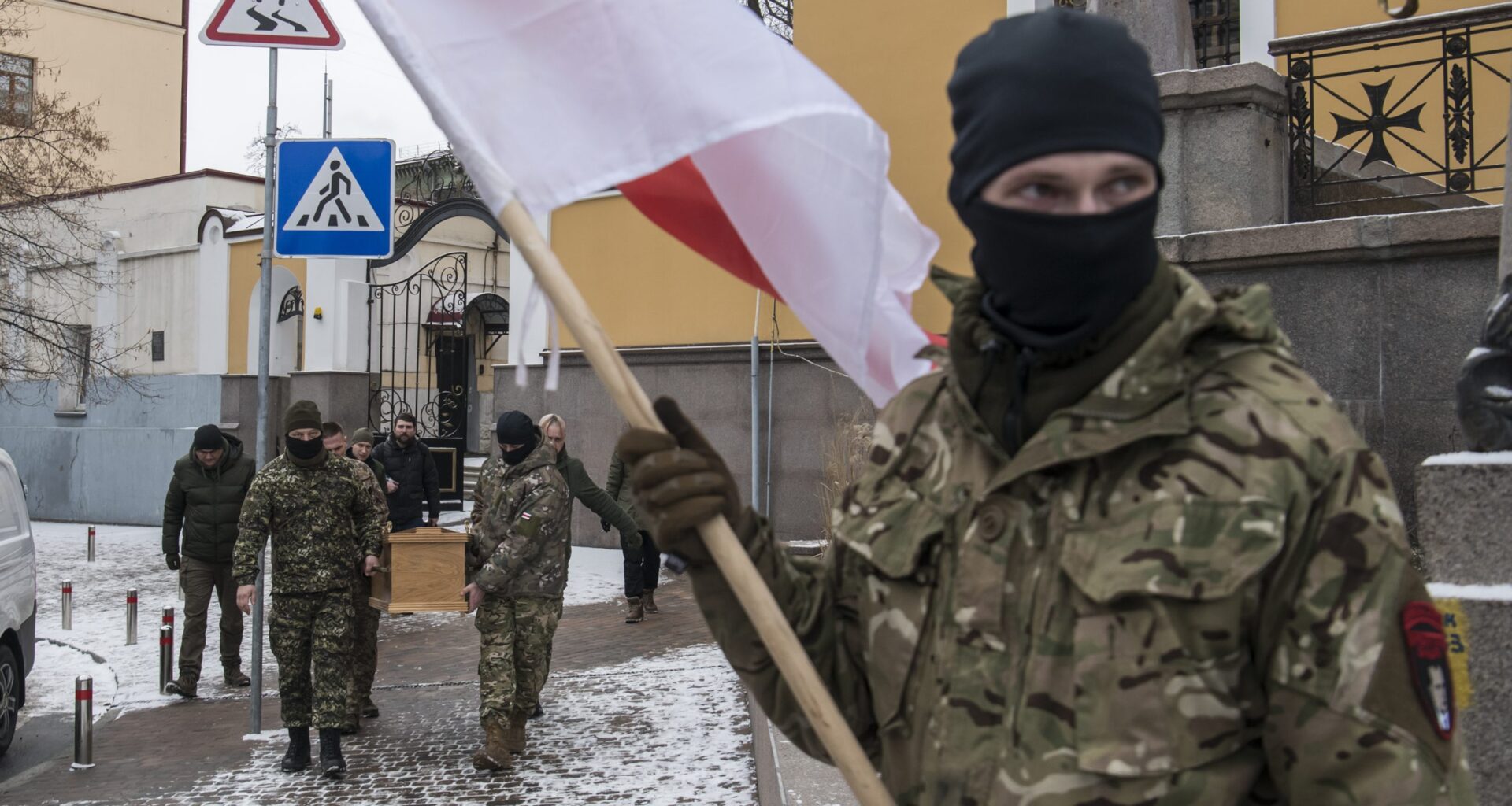Pavel Shurmei is one of many Belarusian volunteers fighting for Ukraine and is commander of the Kastus Kalinouski Regiment. An Olympic rower in his past life, competing in the 2004 and 2008 games, he flew in from the US to join the fight after the full-scale invasion.
“My wife is Ukrainian. She’s from Mykolaiv. When she texted me that they were bombing the city, I knew what I had to do,” Shurmei said. “I packed up and left.”
And he’s clear he isn’t just fighting for the many friends he’s made in Ukraine since he first visited in 1997, but also for his family and friends back home.
“The fate of free Belarus is being decided here and now,” Shurmei explained. “Belarus will never be free until Russia loses its grip on the region. Victory for Ukraine is a victory for Belarus.” The regime in Minsk has opened a criminal case against Shurmei in absentia.
The Kalinouski Regiment was formally established in 2022 and named after a Belarusian revolutionary who fought Russian imperialism in the 19th century. It has become a symbol of Belarusian resistance in exile. Many joined after the failed protests in Belarus after the rigged 2020 election, when pro-Kremlin dictator Alyaksandr Lukashenka unleashed a brutal crackdown on dissent.
 Photo: Pavel Shurmei (callsign “Dziadzka”), commander of the Kastus Kalinouski Regiment is pictured alongside Belarusian volunteers in Ukraine. Credit: Kastus Kalinouski Regiment
Photo: Pavel Shurmei (callsign “Dziadzka”), commander of the Kastus Kalinouski Regiment is pictured alongside Belarusian volunteers in Ukraine. Credit: Kastus Kalinouski Regiment
But many of the men now complain they are neglected and poorly recognized by Ukraine, the country for which many have fought. That may not matter as much for volunteers from rich, democratic countries like the US and UK, but the consequences for Belarusians are potentially more serious.
Since the start of the full-scale invasion, more than 1,000 Belarusian volunteers have passed through the regiment, and a few hundred remain. Those who stayed have become seasoned soldiers; many have been killed or wounded, but others have returned home, discouraged by bureaucracy or personal loss.
While the battlefield offers a sense of purpose, life away from the front lines is often marked by frustration. Despite their service, Belarusian fighters face persistent legal uncertainty in Ukraine, with some still lacking citizenship, veteran status, or access to adequate medical care.
And the risks they shoulder extend beyond combat. In Belarus, the Lukashenka regime is reported to have detained relatives of those fighting on Ukraine’s side, and there are 220 criminal cases against Belarusians for showing solidarity with Ukraine, according to Alesia Rudnik, director of the Center for New Ideas. In November 2022, Belarusian security forces detained a relative of Vasilii Parfenkov, a fallen soldier from the regiment, and forced him to record a coerced confession linking him to “extremist” Telegram channels.
The families of Belarusian volunteers often receive no government support if they are killed, and Ukrainian border guards detain or harass them because of suspicions over their Belarusian passports.
“At the border, we’re flagged just for being Belarusian,” Shurmei said. “Even wives of fighters have been stopped and interrogated. It’s hard not to feel like we’re treated as outsiders, despite risking our lives.”
He voiced his frustration at the Ukrainian parliament’s failure to advance measures to grant citizenship to Belarusian volunteers who have been fighting against Russia, apparently because it’s not a priority for Kyiv at the moment. Some, despite serving on the front lines for three years, have yet to receive official recognition as veterans, Shurmei said.
Get the Latest
Sign up to receive regular emails and stay informed about CEPA’s work.
The extradition of Belarusian soldier Vasil Verameichyk from Vietnam to Belarus also highlighted the Lukashenka regime’s aggressive pursuit of its opponents abroad. A member of the regiment on a break from the frontline, Verameichyk was kidnapped and forced into a televised propaganda confession alleging Western-backed plans to invade Belarus.
The first Kalinouski regiment member captured by Belarus, he had gone to Vietnam, where he had friends and visa-free access, after being denied entry to EU countries, according to Franak Viacorka, a senior aide to Belarusian opposition leader Sviatlana Tsikhanouskaya.
His abduction reflected how much the regime in Minsk fears the Belarusians fighting in Ukraine. Pavel Slunkin, a visiting fellow at the European Council on Foreign Relations, said the case also highlighted the limbo of Belarusian volunteers, who lack legal protection from Ukraine and face global persecution by the Belarusian and Russian security services.
 Photo: Pavel Shurmei (callsign “Dziadzka”) has been the commander of the Kastus Kalinouski Regiment since 2024. Credit: Kastus Kalinouski Regiment
Photo: Pavel Shurmei (callsign “Dziadzka”) has been the commander of the Kastus Kalinouski Regiment since 2024. Credit: Kastus Kalinouski Regiment
Securing Ukrainian citizenship would help them receive those protections, he said.
Where formal support is lacking, volunteers fill the gaps; Belarusian exiles around the world have joined Ukrainian sponsors of the regiment by stepping up.
“The Belarusian diaspora has remained loyal to the Kalinouski Regiment, providing consistent support in the form of money, military equipment, vehicles, and rehabilitation initiatives for former volunteers,” Rudnik said.
Civilian supporters provide vehicles, drone parts, and night vision equipment; otherwise, most of the fighters purchase their own gear with money saved from their small frontline salaries.
“The Ukrainian army gives us weapons and armor, but everything else, we buy ourselves,” Shurmei said. “The diaspora is our lifeline.”
And by helping, they are keeping alive hope for a free Belarus, he added. “After our victory, I want to go home and help change the situation there.”
David Kirichenko is a freelance journalist and an Associate Research Fellow at the Henry Jackson Society. He can be found on X/Twitter @DVKirichenko.
Europe’s Edge is CEPA’s online journal covering critical topics on the foreign policy docket across Europe and North America. All opinions expressed on Europe’s Edge are those of the author alone and may not represent those of the institutions they represent or the Center for European Policy Analysis. CEPA maintains a strict intellectual independence policy across all its projects and publications.
Europe’s Edge
CEPA’s online journal covering critical topics on the foreign policy docket across Europe and North America.

